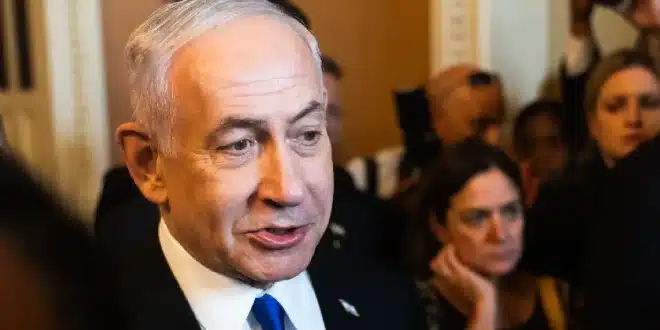Israeli Prime Minister Benjamin Netanyahu has expressed willingness to pursue a permanent agreement with Hamas to bring an end to the Gaza war, contingent on an upcoming temporary ceasefire. However, he stressed that any lasting deal would require Hamas to relinquish both its weapons and control over Gaza—terms the group has so far rejected.
Netanyahu’s remarks come as diplomatic efforts intensify to secure a 60-day pause in the 21-month-long conflict. The Prime Minister’s statements were made during a trip to Washington, where negotiations around the truce featured prominently in talks with U.S. President Donald Trump.
Ceasefire Talks Progress Amid Civilian Casualties
As indirect talks continue in Qatar, mediated with international support, Hamas has reportedly agreed to release 10 of the 20 surviving hostages captured during the October 7, 2023 attack that ignited the war. Israeli Foreign Minister Gideon Saar confirmed that although “progress has been made,” finalizing a comprehensive agreement remains complex and could take several more days.
According to Saar, the proposed outline includes the release of eight hostages early in the truce, followed by two more on the 50th day. Additionally, the remains of 18 deceased hostages are to be returned to Israel. However, no consensus has yet been reached regarding the number of Palestinian prisoners to be exchanged.
A central obstacle remains Hamas’ insistence on unrestricted humanitarian access to Gaza, a full Israeli military withdrawal, and what it calls “real guarantees” of a lasting peace. Saar acknowledged that deep divisions persist, particularly around who would govern Gaza once the conflict ends. He did indicate, however, that Israel would be willing to allow Hamas leaders safe passage into exile.
Escalating Violence Undermines Diplomatic Momentum
Despite ceasefire negotiations, violence on the ground has continued. On Thursday, Gaza’s civil defense agency reported that at least 66 people were killed in Israeli airstrikes across the strip, including eight children who were waiting outside a health clinic in Deir al-Balah to receive nutritional aid.
The UN’s children’s agency confirmed the deaths and highlighted the case of a one-year-old boy who, according to his mother, had spoken his first words just hours before being killed.
Yousef Al-Aydi, a witness to the clinic bombing, described scenes of horror: “The ground shook beneath our feet, and everything around us turned into blood and deafening screams.”
Rabih Torbay, president of the U.S.-based medical NGO Project Hope, which operates the targeted clinic, condemned the attack as “a blatant violation of humanitarian law.”
The Israeli military said the strike was aimed at a Hamas militant involved in the 2023 incursion into Israel, and added it “regrets any harm to uninvolved individuals.”
Mounting Death Toll and Humanitarian Crisis
According to the health ministry in Gaza, which is governed by Hamas, the total number of Palestinian deaths since the conflict began has reached 57,762—mostly civilians. Meanwhile, Israel reports that the initial October 2023 assault by Hamas left 1,219 people dead, with most victims being civilians. That same attack resulted in 251 hostages being taken, of whom 49 are still believed to be in Gaza, including 27 confirmed dead by Israeli military assessments.
Hamas official Bassem Naim reiterated the group’s rejection of any arrangement that results in a continued Israeli presence or influence in Gaza. Specifically, he criticized Israel’s military plans to create buffer zones and the continued control over Rafah and the so-called Morag Corridor. “We will not accept the forced fragmentation of Gaza into isolated enclaves,” he said.
Hamas is also demanding the end of aid delivery mechanisms controlled or backed by the U.S. and Israel, which it claims have contributed to civilian deaths during food distributions.
Netanyahu: Disarmament or Force
Facing domestic criticism over mounting Israeli military casualties, Netanyahu reiterated that disarming Hamas and ending its rule in Gaza are “non-negotiable conditions.” He expressed hope that such goals could be achieved through diplomacy during the proposed ceasefire window, but made clear that Israel would resort to military force if talks failed.
“If we can accomplish this through negotiations, that would be ideal,” Netanyahu said. “But if not, then we will rely on the strength and courage of our heroic army.”
What Comes Next?
As the prospect of a 60-day ceasefire looms, the path to a durable peace remains deeply uncertain. Key issues—including the postwar governance of Gaza, prisoner exchanges, humanitarian access, and the return of hostages—remain unresolved.
While international actors push for a breakthrough, the continuing civilian toll and entrenched positions on both sides threaten to derail fragile progress. Whether diplomacy can take hold in the coming days may determine whether the Gaza war sees an extended pause—or a devastating continuation.


